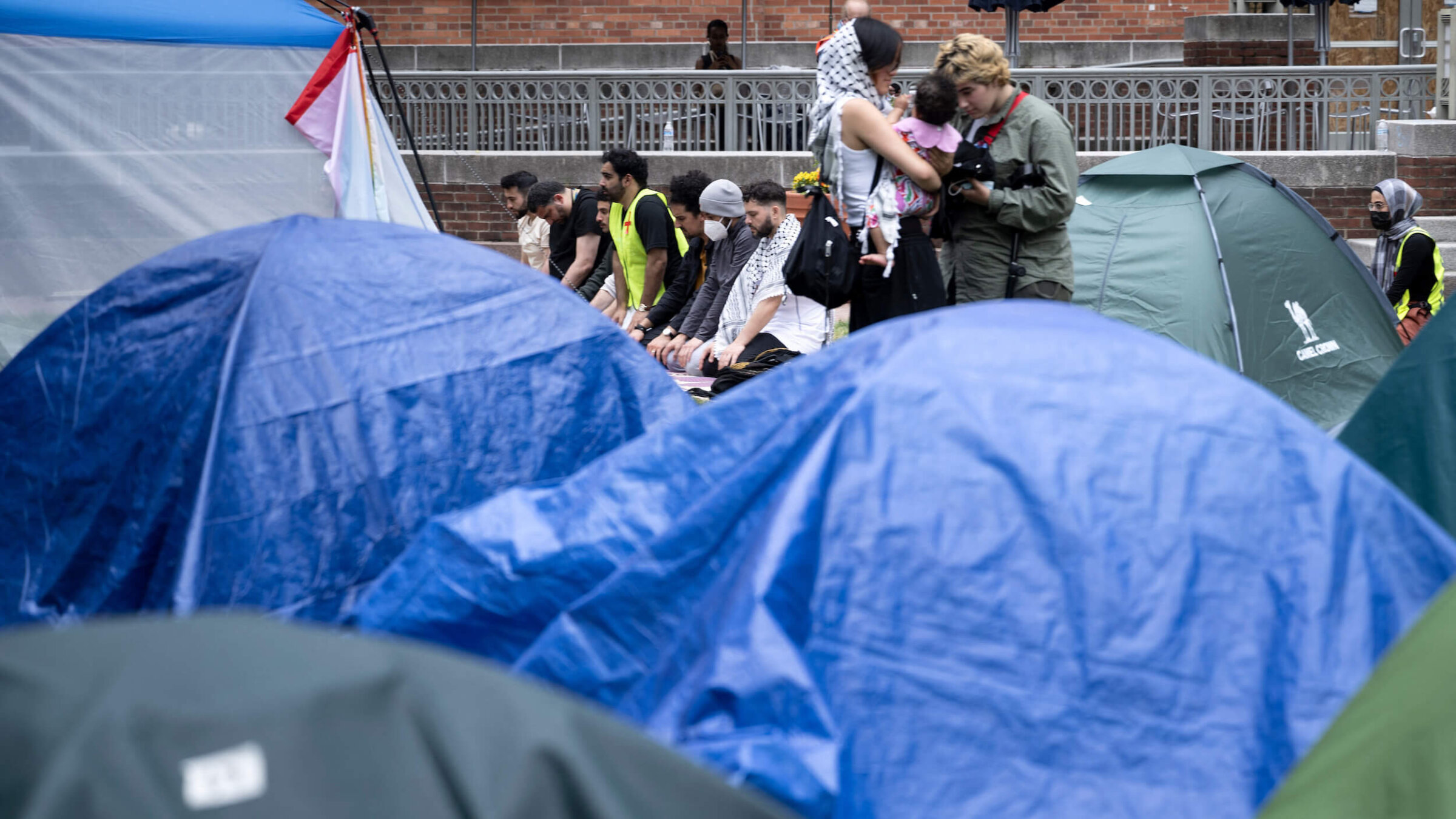Campus protesters want more than a free Palestine. They want a better America.
Biden needs to focus less on Israel to win young people’s votes

Student protesters are upset about the war in Gaza — but that’s far from their only motivating concern. Photo by Brendan Smialowski/AFP/Getty Images
CHICAGO — When I visited the pro-Palestinian encampment at the University of Illinois campus in downtown Chicago last week, I was at first surprised to see young women passing out fliers about reproductive rights. I encountered people of all ages and stripes, including those who usually make the news for being victims of perpetrators of gun violence.
Of course there were protesters wrapped in kaffiyehs and waving, wearing or otherwise displaying Palestinian flags, but there was also a gentleman who asked me, “Where the hell is even Pakistan,” apparently confusing two distant places that start with a P.
Everyone is out there for their own reasons, and they’re not all about Israel. Young people are being impacted by the same forces that are impacting all Americans everyday. Many are showing up at these protests hoping that their issue might get a sliver of the attention that the Gaza war is getting.
I, too, had my own reason for going. Since Oct. 7, I’ve been desperately trying to avoid talking about Israel and the war in Gaza, because I’m afraid of offending either my Jewish or my Black communities. But as the war has come to occupy an increasingly large space in everyone’s life, it became impossible to keep my head down, as friends and colleagues in both communities look to me to explain what is going on in the other.
So I went to see for myself what was happening inside one of the pro-Palestinian encampments that have dominated the headlines for weeks. What I saw and heard shocked me, and not for the reasons one might think.
I saw many protesters who clearly cared deeply about the conflict in Gaza and knew its details, explaining to anyone who would listen about what they were doing and why. But the more people I spoke to, the more things became apparent that are often hidden beneath the chants and the tents.
This is not a news flash, but it is entirely true that not all of the protesters are students. And, as evidenced by the young man who did not even realize that it was Palestine and not Pakistan that he was ostensibly there to support, it became clear to me that many of the protesters aren’t even protesters at all. They’re simply Americans who believe that their concerns aren’t being heard by either party and who are attempting to get the attention of someone. Of anyone.
I saw people there who are food insecure and unhoused. A few told me they came to the encampment because there was free food and tents.
Most of the people I spoke with are not anti-Israel or pro-Palestine. They are anti-establishment. They don’t hate Jews. They hate Joe Biden and an administration that time and again has proven its ironclad commitment to Israel’s well-being while repeatedly failing to show that same level of support to issues that affect marginalized groups here like climate change, inflation, and gun violence.
This is the part that worries me most. At a time when the Biden administration should be focusing on the bread and butter issues to show Americans how it has helped them, it is spending too much energy on how best to prove its fealty to Israel.
This is a mistake. And neither Jews nor non-Jewish Black people can afford to let it happen.
Before I visited the encampment, I was talking with a young Black man who is not Jewish, and who is no expert in geopolitical disputes. When I mentioned the rise in antisemitism since Oct. 7, he stopped me and said: “America loves Jews more than it cares about us. No other group gets the same kind of attention that Israel and the Jewish people do from our government.”
He likened Jews to a favorite child, the one who always gets special treatment. As a parent, child, and a sibling myself, this makes a lot of sense to me. At different times, we all believe our parents may be favoring one of our siblings over us, and have no clue that our siblings are thinking the same.
In the best-case scenario, the kids all love each other deeply but harbor some resentment toward their parents for perceived favoritism. In the worst, however, the favorite son becomes like the biblical Joseph with his colorful coat.
In ancient times, Joseph’s brothers threw him into a pit and sold him off into slavery. Today, Joseph is simply canceled, ostracized on social media and protested against on college campuses.
I’m convinced that most of the protesters aren’t out there because they hate their siblings — or Jews, or even Israel. They’re doing it because in comparison to the support their government is giving the Jewish state, it’s become glaringly obvious how little it seems to support them.
Even if the war ended today, it would not change the fact that many young Americans and people from marginalized groups feel less protected by their country than they did before Biden and his team showed them what real, actual support looks like.
People are out there on campuses and in the streets around them because there is something profoundly broken in our country.
It’s far beyond time for Washington to begin spending the money we claim not to have on mental health services, education and improving the lives of Americans in need, in short, on creating peace at home. Maybe if we did so, there wouldn’t be so many people demanding radical change abroad.























